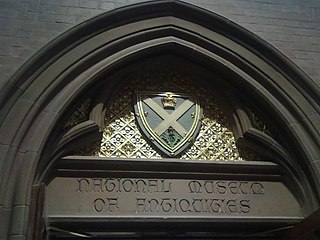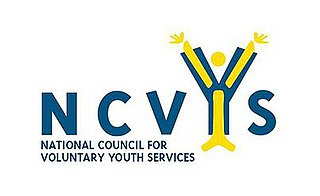
Tate is an institution that houses, in a network of four art galleries, the United Kingdom's national collection of British art, and international modern and contemporary art. It is not a government institution, but its main sponsor is the UK Department for Culture, Media and Sport.

The Society of Antiquaries of Scotland is the senior antiquarian body of Scotland, with its headquarters in the National Museum of Scotland, Chambers Street, Edinburgh. The Society's aim is to promote the cultural heritage of Scotland.

Arts Council England is an arm's length non-departmental public body of the Department for Culture, Media and Sport. It is also a registered charity. It was formed in 1994 when the Arts Council of Great Britain was divided into three separate bodies for England, Scotland and Wales. The arts funding system in England underwent considerable reorganisation in 2002 when all of the regional arts boards were subsumed into Arts Council England and became regional offices of the national organisation.
The Renewables Obligation (RO) was designed to encourage generation of electricity from eligible renewable sources in the United Kingdom. It was introduced in April 2002, both in England and Wales and in Scotland albeit in a slightly different form: the Renewables Obligation (Scotland). The RO was later introduced in Northern Ireland in April 2005. In all cases, replacing the Non-Fossil Fuel Obligation which operated from 1990.

Abertay University, formerly the University of Abertay Dundee, is a public university in the city of Dundee, Scotland. In 1872, Sir David Baxter, 1st Baronet of Kilmaron, left a bequest for the establishment of a mechanics' institute in Dundee and the Dundee Institute of Technology was formed in 1888. As early as 1902 it was recognised by the Scottish Education Department as an educational hub, and was one of the first to be designated a central institution, akin to an "industrial university". Abertay gained university status in 1994.

The Crafts Council is the national development agency for contemporary craft in the United Kingdom, and is funded by Arts Council England.

The Carbon Trust is a United Kingdom-based consultancy established in March 2001. Its aim is to accelerate the pace of private sector decarbonisation and increase energy efficiency in the United Kingdom and worldwide.
The Institute of Conservation(Icon) is the professional charitable body, representing and supporting the practice and profession of conservation. It has around 2500 members worldwide, including professional conservators, scientists and teachers involved with the care of heritage objects and buildings.
Wales Council for Voluntary Action (WCVA) is the national membership organisation for the third sector and volunteering in Wales. Its aim is to work towards 'A future where the third sector and volunteering thrive across Wales, improving wellbeing for all'.

Community Education, also known as Community-Based Education or Community Learning & Development, or Development Education is an organization's programs to promote learning and social development work with individuals and groups in their communities using a range of formal and informal methods. A common defining feature is that programmes and activities are developed in dialogue with communities and participants. The purpose of community learning and development is to develop the capacity of individuals and groups of all ages through their actions, the capacity of communities, to improve their quality of life. Central to this is their ability to participate in democratic processes.

The Council of British International Schools (COBIS) serves English International Schools around the globe, representing over 450 Member Schools in 79 countries and over 150 Supporting Associate organisations.

Glasgow Women's Library is a public library, registered company and charity based in the Bridgeton area of Glasgow, Scotland. It is the only accredited museum dedicated to women's history and provides information relevant to women's culture and achievements. It tries to operate on feminist principles. The library was awarded Recognised Collection of National Significance to Scotland status in 2015, as the collection contains valuable resources pertaining to women and their lives. In 2018, it was shortlisted for Museum of the Year. The museum supplies and encourages training and education, as well as skill-sharing via volunteers and/or staff.
The Council for Dance, Drama and Musical Theatre (CDMT), formerly known as the Council for Dance Education and Training (CDET), is the quality assurance and membership body for the professional dance, drama and musical theatre industries in the United Kingdom. CDMT was founded in 1979.

Kingston Museum is an accredited museum in Kingston upon Thames, southwest London, England. The Scottish-American philanthropist Andrew Carnegie funded the building of the museum, which adjoins Kingston Library.

The National Council for Voluntary Youth Services (NCVYS) was a membership network of over 200 voluntary and community organisations, as well as local and regional networks, that work with and for young people across England. The organisation closed in 2016. For 80 years, NCVYS acted as an independent voice of the voluntary and community youth sector, working to inform and influence public policy, supporting members to improve the quality of their work, and also raising the profile of the voluntary and community sector's work with young people.

The Contemporary Art Society (CAS) is an independent charity that champions the collecting of outstanding contemporary art and craft for UK museum collections. Since its founding in 1910 the organisation has donated over 10,000 works to museums across the UK. From the 1930s the Society also donated works to Commonwealth museums, but since 1989 the focus has remained exclusively on UK institutions.
Reyahn King is a British curator and museum director. She is the chief executive officer of York Museums Trust.

The City Art Centre is part of the Museums & Galleries Edinburgh, which sits under the Culture directorate of the City of Edinburgh Council. The City Art Centre has a collection which include historic and modern Scottish painting and photography, as well as contemporary art and craft. It is an exhibition based venue with no permanent displays.
Museum Accreditation in the UK is a process whereby a museum is recognised as meeting best standards in the field in terms of governance and management, collections care and management, and information and services provided to users.












